Entrepreneurship and Small Business Management Analysis Report - UK
VerifiedAdded on 2023/01/16
|11
|3452
|78
Report
AI Summary
This report delves into the realm of entrepreneurship, examining its role in establishing new businesses within growth-oriented industries. It explores the characteristics and skills of successful entrepreneurs, highlighting their contribution to economic growth and job creation. The report analyzes the impact of micro and small businesses on both national and international economies, emphasizing their role in employment generation and infrastructure development. It also investigates the significance of small businesses and startups in fostering the growth of the social economy in the UK, including their contributions to job creation, improved living standards, and market competition. Furthermore, the report dissects the traits, skills, and personality aspects of successful entrepreneurs, assessing how personality traits reflect their motivation and mindset. Finally, it critically analyzes the educational background and experience that can either hinder or foster entrepreneurship, providing a comprehensive overview of the entrepreneurial landscape.

Entrepreneurship and
Small Business
Management
Small Business
Management
Paraphrase This Document
Need a fresh take? Get an instant paraphrase of this document with our AI Paraphraser
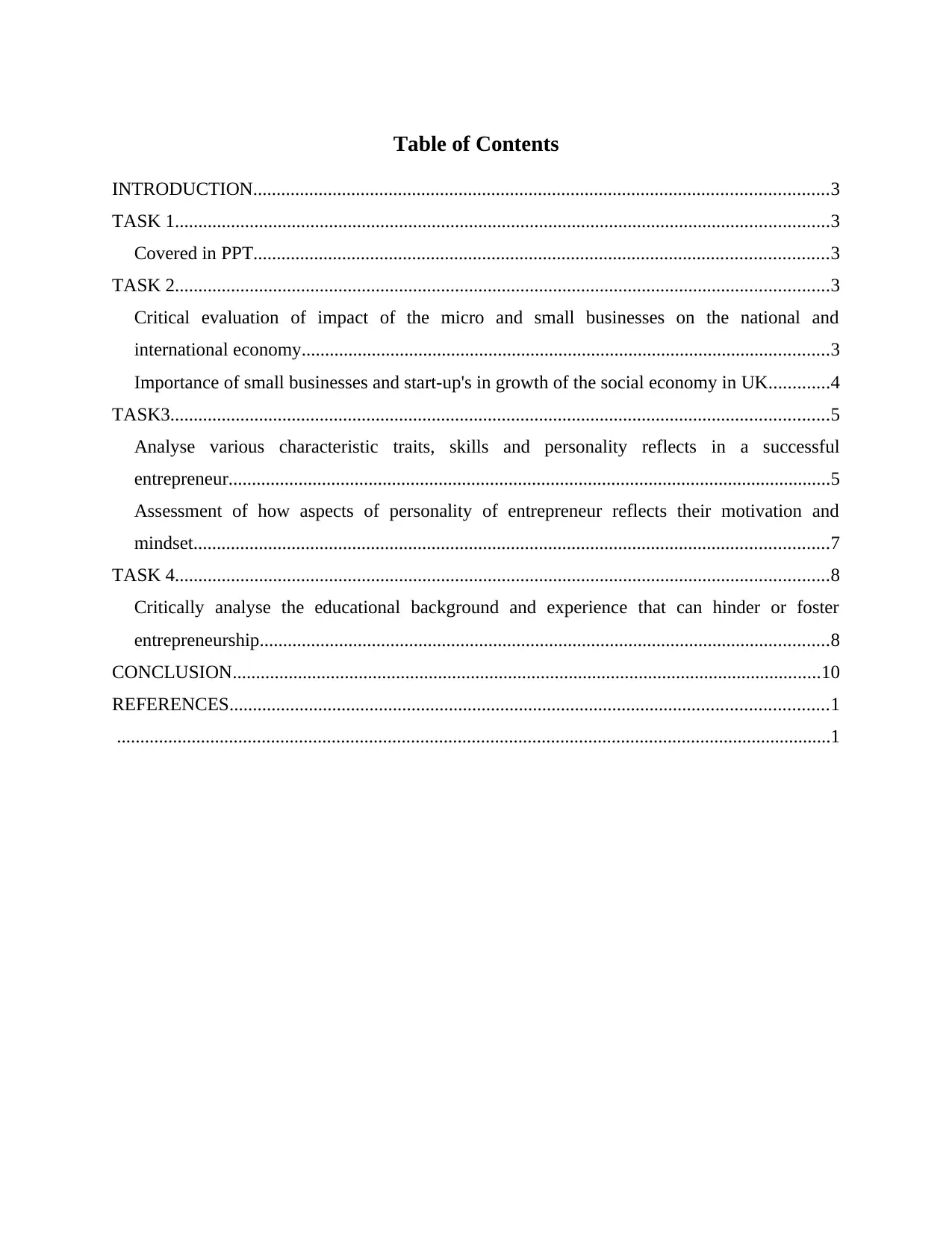
Table of Contents
INTRODUCTION...........................................................................................................................3
TASK 1............................................................................................................................................3
Covered in PPT...........................................................................................................................3
TASK 2............................................................................................................................................3
Critical evaluation of impact of the micro and small businesses on the national and
international economy.................................................................................................................3
Importance of small businesses and start-up's in growth of the social economy in UK.............4
TASK3.............................................................................................................................................5
Analyse various characteristic traits, skills and personality reflects in a successful
entrepreneur.................................................................................................................................5
Assessment of how aspects of personality of entrepreneur reflects their motivation and
mindset........................................................................................................................................7
TASK 4............................................................................................................................................8
Critically analyse the educational background and experience that can hinder or foster
entrepreneurship..........................................................................................................................8
CONCLUSION..............................................................................................................................10
REFERENCES................................................................................................................................1
.........................................................................................................................................................1
INTRODUCTION...........................................................................................................................3
TASK 1............................................................................................................................................3
Covered in PPT...........................................................................................................................3
TASK 2............................................................................................................................................3
Critical evaluation of impact of the micro and small businesses on the national and
international economy.................................................................................................................3
Importance of small businesses and start-up's in growth of the social economy in UK.............4
TASK3.............................................................................................................................................5
Analyse various characteristic traits, skills and personality reflects in a successful
entrepreneur.................................................................................................................................5
Assessment of how aspects of personality of entrepreneur reflects their motivation and
mindset........................................................................................................................................7
TASK 4............................................................................................................................................8
Critically analyse the educational background and experience that can hinder or foster
entrepreneurship..........................................................................................................................8
CONCLUSION..............................................................................................................................10
REFERENCES................................................................................................................................1
.........................................................................................................................................................1
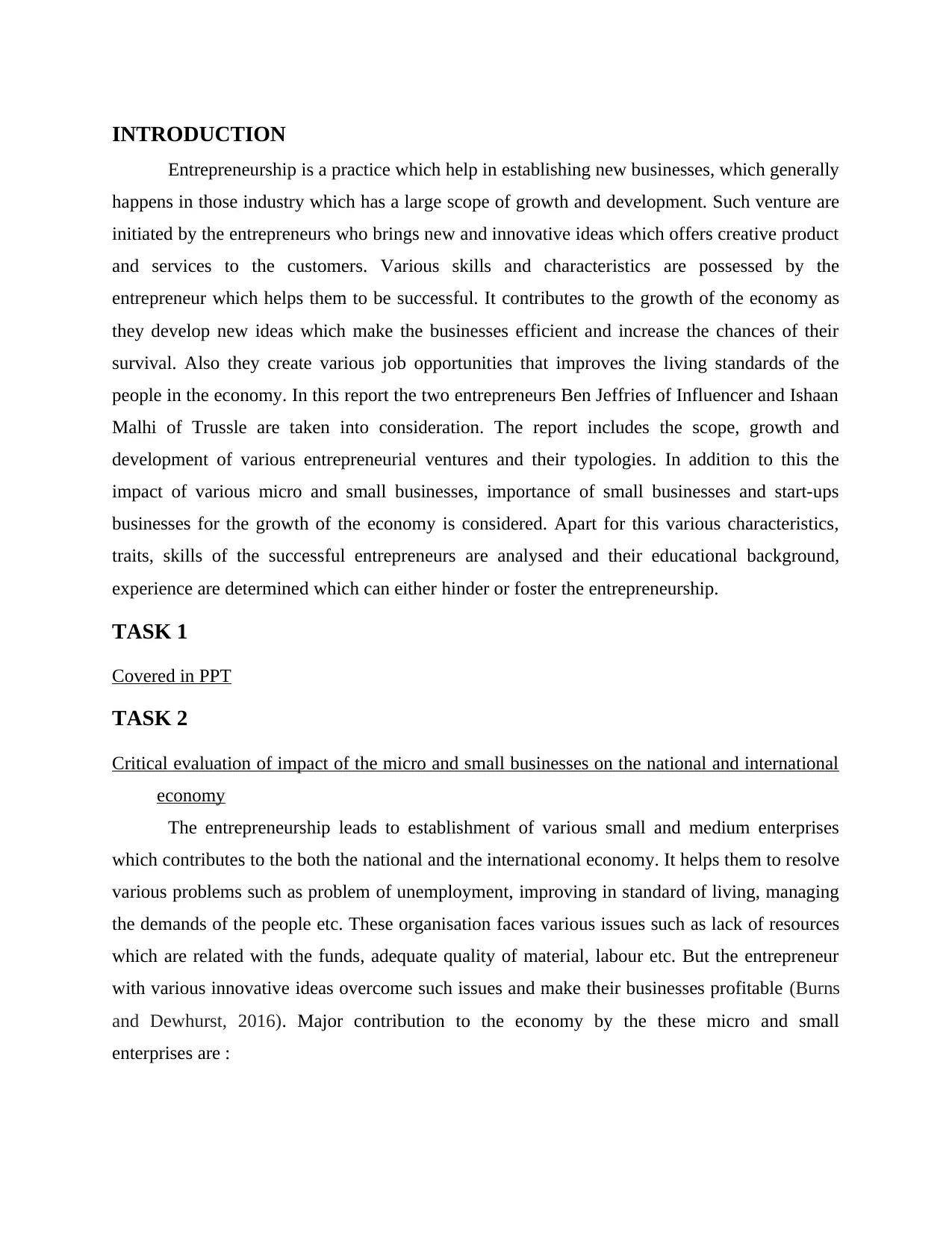
INTRODUCTION
Entrepreneurship is a practice which help in establishing new businesses, which generally
happens in those industry which has a large scope of growth and development. Such venture are
initiated by the entrepreneurs who brings new and innovative ideas which offers creative product
and services to the customers. Various skills and characteristics are possessed by the
entrepreneur which helps them to be successful. It contributes to the growth of the economy as
they develop new ideas which make the businesses efficient and increase the chances of their
survival. Also they create various job opportunities that improves the living standards of the
people in the economy. In this report the two entrepreneurs Ben Jeffries of Influencer and Ishaan
Malhi of Trussle are taken into consideration. The report includes the scope, growth and
development of various entrepreneurial ventures and their typologies. In addition to this the
impact of various micro and small businesses, importance of small businesses and start-ups
businesses for the growth of the economy is considered. Apart for this various characteristics,
traits, skills of the successful entrepreneurs are analysed and their educational background,
experience are determined which can either hinder or foster the entrepreneurship.
TASK 1
Covered in PPT
TASK 2
Critical evaluation of impact of the micro and small businesses on the national and international
economy
The entrepreneurship leads to establishment of various small and medium enterprises
which contributes to the both the national and the international economy. It helps them to resolve
various problems such as problem of unemployment, improving in standard of living, managing
the demands of the people etc. These organisation faces various issues such as lack of resources
which are related with the funds, adequate quality of material, labour etc. But the entrepreneur
with various innovative ideas overcome such issues and make their businesses profitable (Burns
and Dewhurst, 2016). Major contribution to the economy by the these micro and small
enterprises are :
Entrepreneurship is a practice which help in establishing new businesses, which generally
happens in those industry which has a large scope of growth and development. Such venture are
initiated by the entrepreneurs who brings new and innovative ideas which offers creative product
and services to the customers. Various skills and characteristics are possessed by the
entrepreneur which helps them to be successful. It contributes to the growth of the economy as
they develop new ideas which make the businesses efficient and increase the chances of their
survival. Also they create various job opportunities that improves the living standards of the
people in the economy. In this report the two entrepreneurs Ben Jeffries of Influencer and Ishaan
Malhi of Trussle are taken into consideration. The report includes the scope, growth and
development of various entrepreneurial ventures and their typologies. In addition to this the
impact of various micro and small businesses, importance of small businesses and start-ups
businesses for the growth of the economy is considered. Apart for this various characteristics,
traits, skills of the successful entrepreneurs are analysed and their educational background,
experience are determined which can either hinder or foster the entrepreneurship.
TASK 1
Covered in PPT
TASK 2
Critical evaluation of impact of the micro and small businesses on the national and international
economy
The entrepreneurship leads to establishment of various small and medium enterprises
which contributes to the both the national and the international economy. It helps them to resolve
various problems such as problem of unemployment, improving in standard of living, managing
the demands of the people etc. These organisation faces various issues such as lack of resources
which are related with the funds, adequate quality of material, labour etc. But the entrepreneur
with various innovative ideas overcome such issues and make their businesses profitable (Burns
and Dewhurst, 2016). Major contribution to the economy by the these micro and small
enterprises are :
⊘ This is a preview!⊘
Do you want full access?
Subscribe today to unlock all pages.

Trusted by 1+ million students worldwide
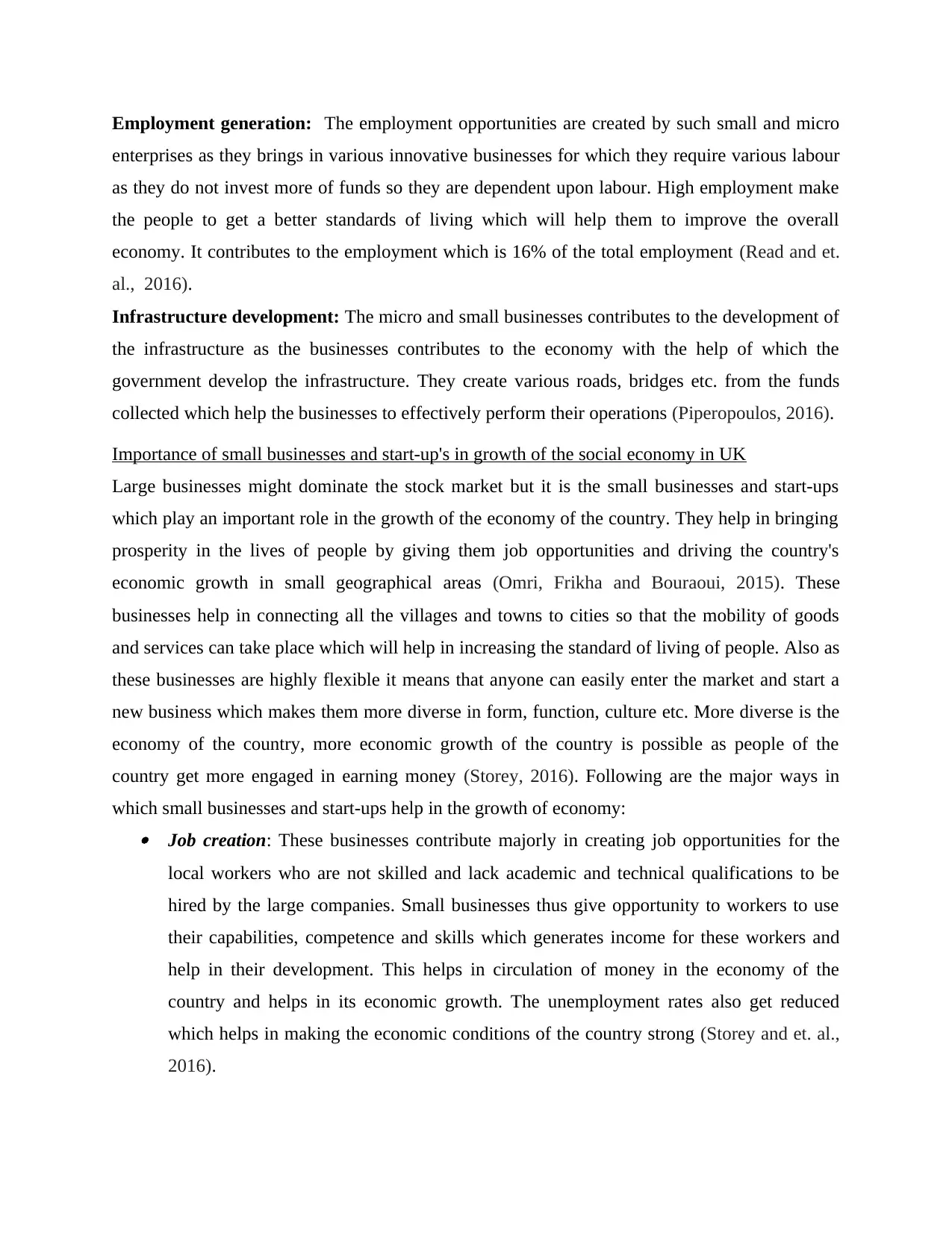
Employment generation: The employment opportunities are created by such small and micro
enterprises as they brings in various innovative businesses for which they require various labour
as they do not invest more of funds so they are dependent upon labour. High employment make
the people to get a better standards of living which will help them to improve the overall
economy. It contributes to the employment which is 16% of the total employment (Read and et.
al., 2016).
Infrastructure development: The micro and small businesses contributes to the development of
the infrastructure as the businesses contributes to the economy with the help of which the
government develop the infrastructure. They create various roads, bridges etc. from the funds
collected which help the businesses to effectively perform their operations (Piperopoulos, 2016).
Importance of small businesses and start-up's in growth of the social economy in UK
Large businesses might dominate the stock market but it is the small businesses and start-ups
which play an important role in the growth of the economy of the country. They help in bringing
prosperity in the lives of people by giving them job opportunities and driving the country's
economic growth in small geographical areas (Omri, Frikha and Bouraoui, 2015). These
businesses help in connecting all the villages and towns to cities so that the mobility of goods
and services can take place which will help in increasing the standard of living of people. Also as
these businesses are highly flexible it means that anyone can easily enter the market and start a
new business which makes them more diverse in form, function, culture etc. More diverse is the
economy of the country, more economic growth of the country is possible as people of the
country get more engaged in earning money (Storey, 2016). Following are the major ways in
which small businesses and start-ups help in the growth of economy: Job creation: These businesses contribute majorly in creating job opportunities for the
local workers who are not skilled and lack academic and technical qualifications to be
hired by the large companies. Small businesses thus give opportunity to workers to use
their capabilities, competence and skills which generates income for these workers and
help in their development. This helps in circulation of money in the economy of the
country and helps in its economic growth. The unemployment rates also get reduced
which helps in making the economic conditions of the country strong (Storey and et. al.,
2016).
enterprises as they brings in various innovative businesses for which they require various labour
as they do not invest more of funds so they are dependent upon labour. High employment make
the people to get a better standards of living which will help them to improve the overall
economy. It contributes to the employment which is 16% of the total employment (Read and et.
al., 2016).
Infrastructure development: The micro and small businesses contributes to the development of
the infrastructure as the businesses contributes to the economy with the help of which the
government develop the infrastructure. They create various roads, bridges etc. from the funds
collected which help the businesses to effectively perform their operations (Piperopoulos, 2016).
Importance of small businesses and start-up's in growth of the social economy in UK
Large businesses might dominate the stock market but it is the small businesses and start-ups
which play an important role in the growth of the economy of the country. They help in bringing
prosperity in the lives of people by giving them job opportunities and driving the country's
economic growth in small geographical areas (Omri, Frikha and Bouraoui, 2015). These
businesses help in connecting all the villages and towns to cities so that the mobility of goods
and services can take place which will help in increasing the standard of living of people. Also as
these businesses are highly flexible it means that anyone can easily enter the market and start a
new business which makes them more diverse in form, function, culture etc. More diverse is the
economy of the country, more economic growth of the country is possible as people of the
country get more engaged in earning money (Storey, 2016). Following are the major ways in
which small businesses and start-ups help in the growth of economy: Job creation: These businesses contribute majorly in creating job opportunities for the
local workers who are not skilled and lack academic and technical qualifications to be
hired by the large companies. Small businesses thus give opportunity to workers to use
their capabilities, competence and skills which generates income for these workers and
help in their development. This helps in circulation of money in the economy of the
country and helps in its economic growth. The unemployment rates also get reduced
which helps in making the economic conditions of the country strong (Storey and et. al.,
2016).
Paraphrase This Document
Need a fresh take? Get an instant paraphrase of this document with our AI Paraphraser
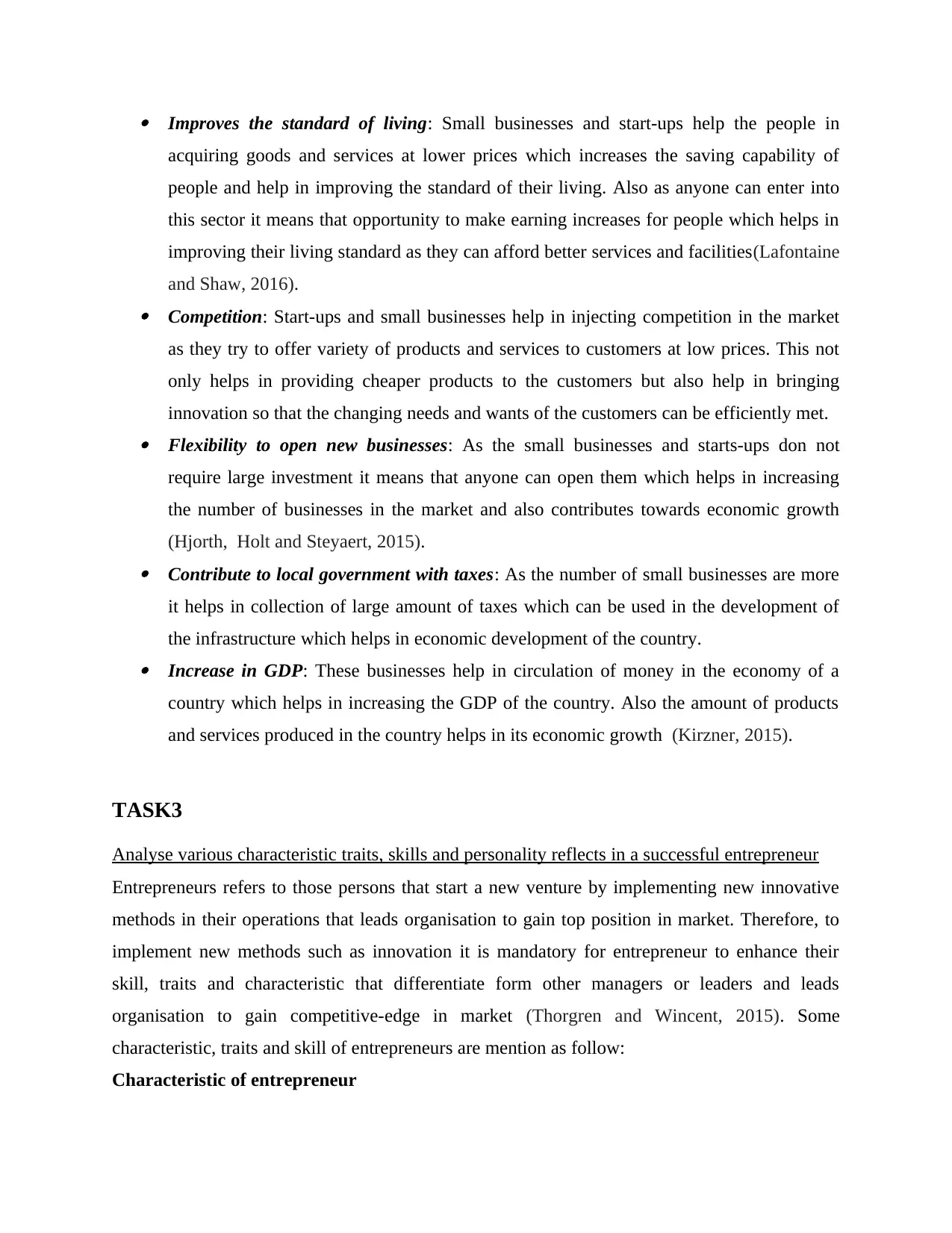
Improves the standard of living: Small businesses and start-ups help the people in
acquiring goods and services at lower prices which increases the saving capability of
people and help in improving the standard of their living. Also as anyone can enter into
this sector it means that opportunity to make earning increases for people which helps in
improving their living standard as they can afford better services and facilities(Lafontaine
and Shaw, 2016). Competition: Start-ups and small businesses help in injecting competition in the market
as they try to offer variety of products and services to customers at low prices. This not
only helps in providing cheaper products to the customers but also help in bringing
innovation so that the changing needs and wants of the customers can be efficiently met. Flexibility to open new businesses: As the small businesses and starts-ups don not
require large investment it means that anyone can open them which helps in increasing
the number of businesses in the market and also contributes towards economic growth
(Hjorth, Holt and Steyaert, 2015). Contribute to local government with taxes: As the number of small businesses are more
it helps in collection of large amount of taxes which can be used in the development of
the infrastructure which helps in economic development of the country. Increase in GDP: These businesses help in circulation of money in the economy of a
country which helps in increasing the GDP of the country. Also the amount of products
and services produced in the country helps in its economic growth (Kirzner, 2015).
TASK3
Analyse various characteristic traits, skills and personality reflects in a successful entrepreneur
Entrepreneurs refers to those persons that start a new venture by implementing new innovative
methods in their operations that leads organisation to gain top position in market. Therefore, to
implement new methods such as innovation it is mandatory for entrepreneur to enhance their
skill, traits and characteristic that differentiate form other managers or leaders and leads
organisation to gain competitive-edge in market (Thorgren and Wincent, 2015). Some
characteristic, traits and skill of entrepreneurs are mention as follow:
Characteristic of entrepreneur
acquiring goods and services at lower prices which increases the saving capability of
people and help in improving the standard of their living. Also as anyone can enter into
this sector it means that opportunity to make earning increases for people which helps in
improving their living standard as they can afford better services and facilities(Lafontaine
and Shaw, 2016). Competition: Start-ups and small businesses help in injecting competition in the market
as they try to offer variety of products and services to customers at low prices. This not
only helps in providing cheaper products to the customers but also help in bringing
innovation so that the changing needs and wants of the customers can be efficiently met. Flexibility to open new businesses: As the small businesses and starts-ups don not
require large investment it means that anyone can open them which helps in increasing
the number of businesses in the market and also contributes towards economic growth
(Hjorth, Holt and Steyaert, 2015). Contribute to local government with taxes: As the number of small businesses are more
it helps in collection of large amount of taxes which can be used in the development of
the infrastructure which helps in economic development of the country. Increase in GDP: These businesses help in circulation of money in the economy of a
country which helps in increasing the GDP of the country. Also the amount of products
and services produced in the country helps in its economic growth (Kirzner, 2015).
TASK3
Analyse various characteristic traits, skills and personality reflects in a successful entrepreneur
Entrepreneurs refers to those persons that start a new venture by implementing new innovative
methods in their operations that leads organisation to gain top position in market. Therefore, to
implement new methods such as innovation it is mandatory for entrepreneur to enhance their
skill, traits and characteristic that differentiate form other managers or leaders and leads
organisation to gain competitive-edge in market (Thorgren and Wincent, 2015). Some
characteristic, traits and skill of entrepreneurs are mention as follow:
Characteristic of entrepreneur
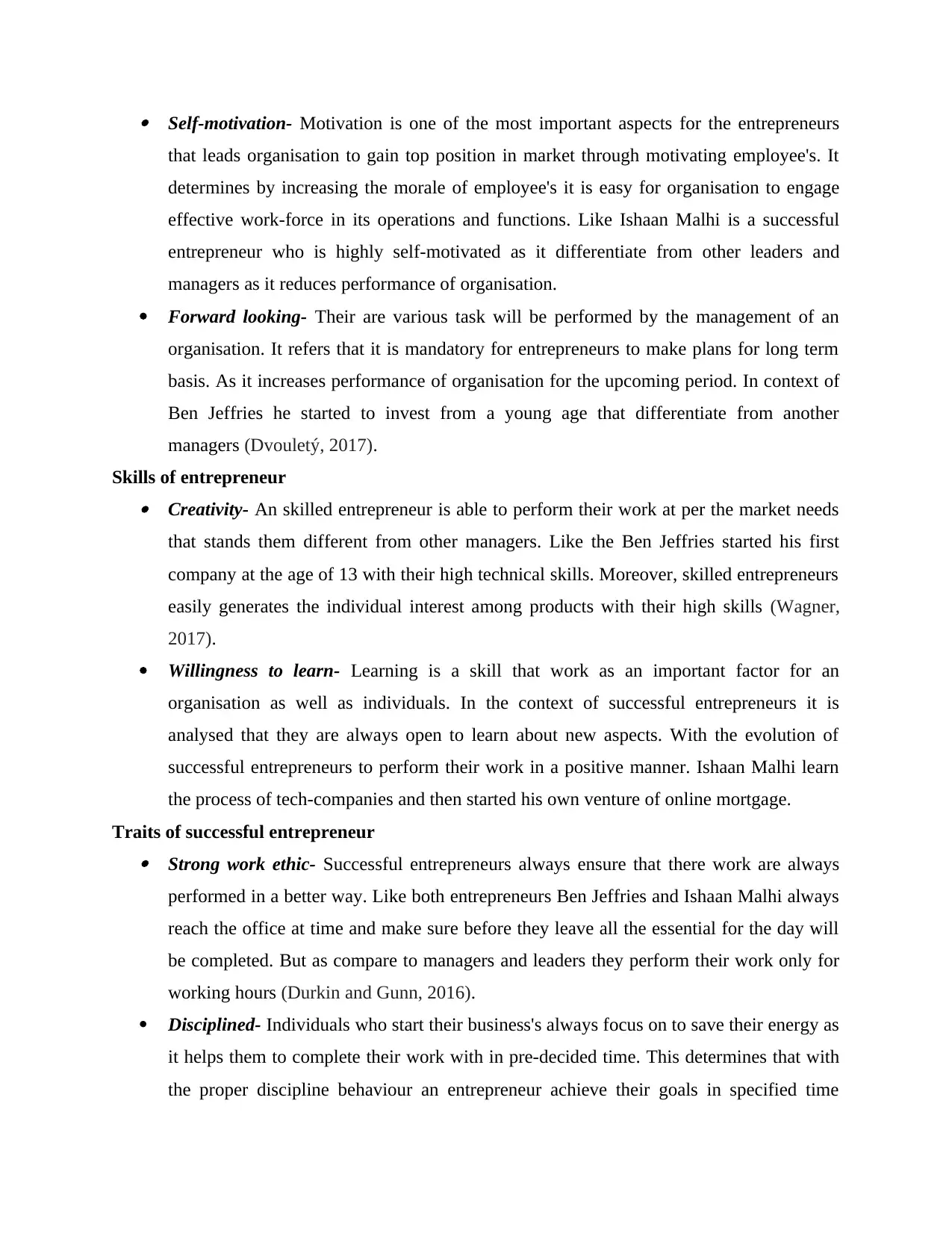
Self-motivation- Motivation is one of the most important aspects for the entrepreneurs
that leads organisation to gain top position in market through motivating employee's. It
determines by increasing the morale of employee's it is easy for organisation to engage
effective work-force in its operations and functions. Like Ishaan Malhi is a successful
entrepreneur who is highly self-motivated as it differentiate from other leaders and
managers as it reduces performance of organisation.
Forward looking- Their are various task will be performed by the management of an
organisation. It refers that it is mandatory for entrepreneurs to make plans for long term
basis. As it increases performance of organisation for the upcoming period. In context of
Ben Jeffries he started to invest from a young age that differentiate from another
managers (Dvouletý, 2017).
Skills of entrepreneur Creativity- An skilled entrepreneur is able to perform their work at per the market needs
that stands them different from other managers. Like the Ben Jeffries started his first
company at the age of 13 with their high technical skills. Moreover, skilled entrepreneurs
easily generates the individual interest among products with their high skills (Wagner,
2017).
Willingness to learn- Learning is a skill that work as an important factor for an
organisation as well as individuals. In the context of successful entrepreneurs it is
analysed that they are always open to learn about new aspects. With the evolution of
successful entrepreneurs to perform their work in a positive manner. Ishaan Malhi learn
the process of tech-companies and then started his own venture of online mortgage.
Traits of successful entrepreneur Strong work ethic- Successful entrepreneurs always ensure that there work are always
performed in a better way. Like both entrepreneurs Ben Jeffries and Ishaan Malhi always
reach the office at time and make sure before they leave all the essential for the day will
be completed. But as compare to managers and leaders they perform their work only for
working hours (Durkin and Gunn, 2016).
Disciplined- Individuals who start their business's always focus on to save their energy as
it helps them to complete their work with in pre-decided time. This determines that with
the proper discipline behaviour an entrepreneur achieve their goals in specified time
that leads organisation to gain top position in market through motivating employee's. It
determines by increasing the morale of employee's it is easy for organisation to engage
effective work-force in its operations and functions. Like Ishaan Malhi is a successful
entrepreneur who is highly self-motivated as it differentiate from other leaders and
managers as it reduces performance of organisation.
Forward looking- Their are various task will be performed by the management of an
organisation. It refers that it is mandatory for entrepreneurs to make plans for long term
basis. As it increases performance of organisation for the upcoming period. In context of
Ben Jeffries he started to invest from a young age that differentiate from another
managers (Dvouletý, 2017).
Skills of entrepreneur Creativity- An skilled entrepreneur is able to perform their work at per the market needs
that stands them different from other managers. Like the Ben Jeffries started his first
company at the age of 13 with their high technical skills. Moreover, skilled entrepreneurs
easily generates the individual interest among products with their high skills (Wagner,
2017).
Willingness to learn- Learning is a skill that work as an important factor for an
organisation as well as individuals. In the context of successful entrepreneurs it is
analysed that they are always open to learn about new aspects. With the evolution of
successful entrepreneurs to perform their work in a positive manner. Ishaan Malhi learn
the process of tech-companies and then started his own venture of online mortgage.
Traits of successful entrepreneur Strong work ethic- Successful entrepreneurs always ensure that there work are always
performed in a better way. Like both entrepreneurs Ben Jeffries and Ishaan Malhi always
reach the office at time and make sure before they leave all the essential for the day will
be completed. But as compare to managers and leaders they perform their work only for
working hours (Durkin and Gunn, 2016).
Disciplined- Individuals who start their business's always focus on to save their energy as
it helps them to complete their work with in pre-decided time. This determines that with
the proper discipline behaviour an entrepreneur achieve their goals in specified time
⊘ This is a preview!⊘
Do you want full access?
Subscribe today to unlock all pages.

Trusted by 1+ million students worldwide
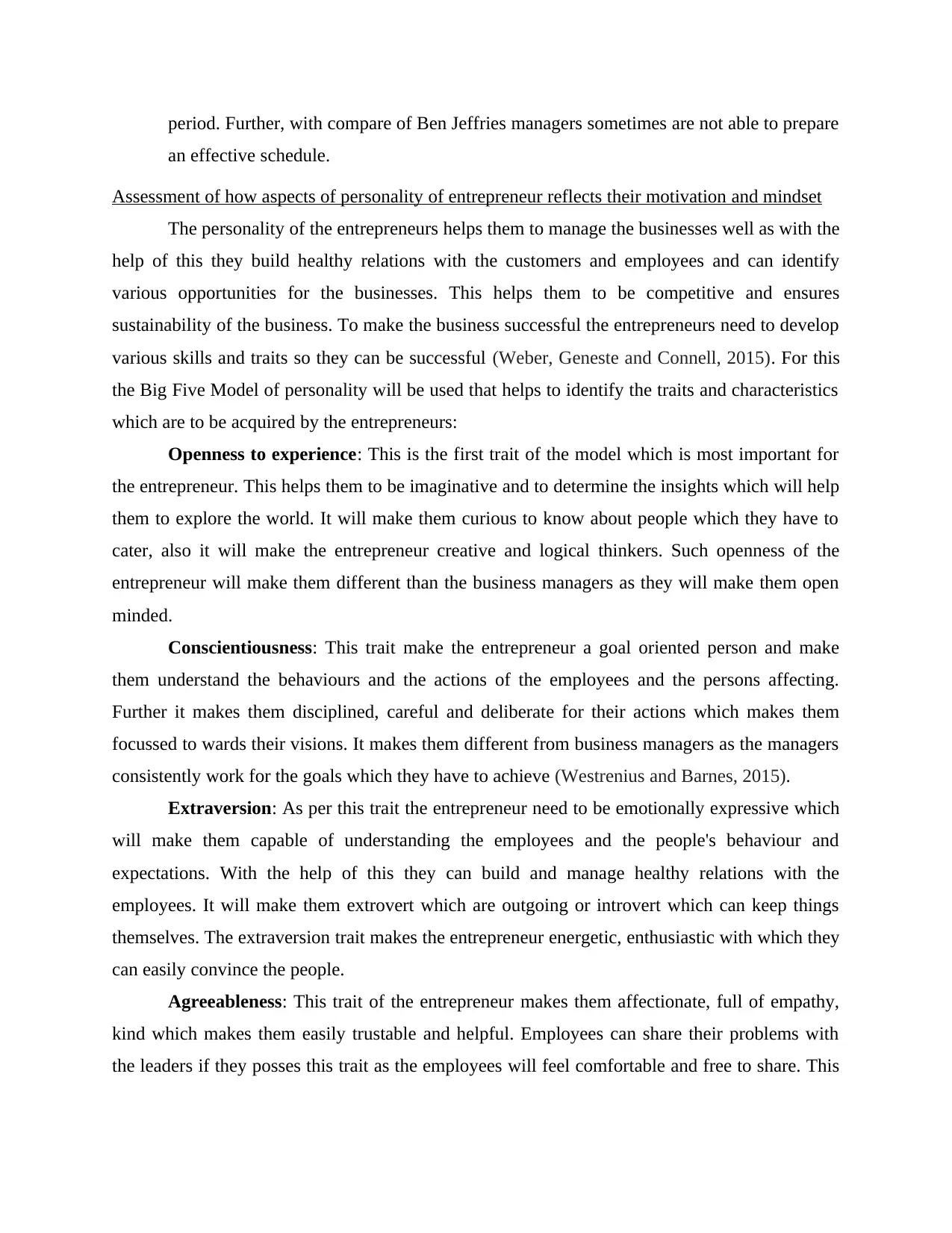
period. Further, with compare of Ben Jeffries managers sometimes are not able to prepare
an effective schedule.
Assessment of how aspects of personality of entrepreneur reflects their motivation and mindset
The personality of the entrepreneurs helps them to manage the businesses well as with the
help of this they build healthy relations with the customers and employees and can identify
various opportunities for the businesses. This helps them to be competitive and ensures
sustainability of the business. To make the business successful the entrepreneurs need to develop
various skills and traits so they can be successful (Weber, Geneste and Connell, 2015). For this
the Big Five Model of personality will be used that helps to identify the traits and characteristics
which are to be acquired by the entrepreneurs:
Openness to experience: This is the first trait of the model which is most important for
the entrepreneur. This helps them to be imaginative and to determine the insights which will help
them to explore the world. It will make them curious to know about people which they have to
cater, also it will make the entrepreneur creative and logical thinkers. Such openness of the
entrepreneur will make them different than the business managers as they will make them open
minded.
Conscientiousness: This trait make the entrepreneur a goal oriented person and make
them understand the behaviours and the actions of the employees and the persons affecting.
Further it makes them disciplined, careful and deliberate for their actions which makes them
focussed to wards their visions. It makes them different from business managers as the managers
consistently work for the goals which they have to achieve (Westrenius and Barnes, 2015).
Extraversion: As per this trait the entrepreneur need to be emotionally expressive which
will make them capable of understanding the employees and the people's behaviour and
expectations. With the help of this they can build and manage healthy relations with the
employees. It will make them extrovert which are outgoing or introvert which can keep things
themselves. The extraversion trait makes the entrepreneur energetic, enthusiastic with which they
can easily convince the people.
Agreeableness: This trait of the entrepreneur makes them affectionate, full of empathy,
kind which makes them easily trustable and helpful. Employees can share their problems with
the leaders if they posses this trait as the employees will feel comfortable and free to share. This
an effective schedule.
Assessment of how aspects of personality of entrepreneur reflects their motivation and mindset
The personality of the entrepreneurs helps them to manage the businesses well as with the
help of this they build healthy relations with the customers and employees and can identify
various opportunities for the businesses. This helps them to be competitive and ensures
sustainability of the business. To make the business successful the entrepreneurs need to develop
various skills and traits so they can be successful (Weber, Geneste and Connell, 2015). For this
the Big Five Model of personality will be used that helps to identify the traits and characteristics
which are to be acquired by the entrepreneurs:
Openness to experience: This is the first trait of the model which is most important for
the entrepreneur. This helps them to be imaginative and to determine the insights which will help
them to explore the world. It will make them curious to know about people which they have to
cater, also it will make the entrepreneur creative and logical thinkers. Such openness of the
entrepreneur will make them different than the business managers as they will make them open
minded.
Conscientiousness: This trait make the entrepreneur a goal oriented person and make
them understand the behaviours and the actions of the employees and the persons affecting.
Further it makes them disciplined, careful and deliberate for their actions which makes them
focussed to wards their visions. It makes them different from business managers as the managers
consistently work for the goals which they have to achieve (Westrenius and Barnes, 2015).
Extraversion: As per this trait the entrepreneur need to be emotionally expressive which
will make them capable of understanding the employees and the people's behaviour and
expectations. With the help of this they can build and manage healthy relations with the
employees. It will make them extrovert which are outgoing or introvert which can keep things
themselves. The extraversion trait makes the entrepreneur energetic, enthusiastic with which they
can easily convince the people.
Agreeableness: This trait of the entrepreneur makes them affectionate, full of empathy,
kind which makes them easily trustable and helpful. Employees can share their problems with
the leaders if they posses this trait as the employees will feel comfortable and free to share. This
Paraphrase This Document
Need a fresh take? Get an instant paraphrase of this document with our AI Paraphraser
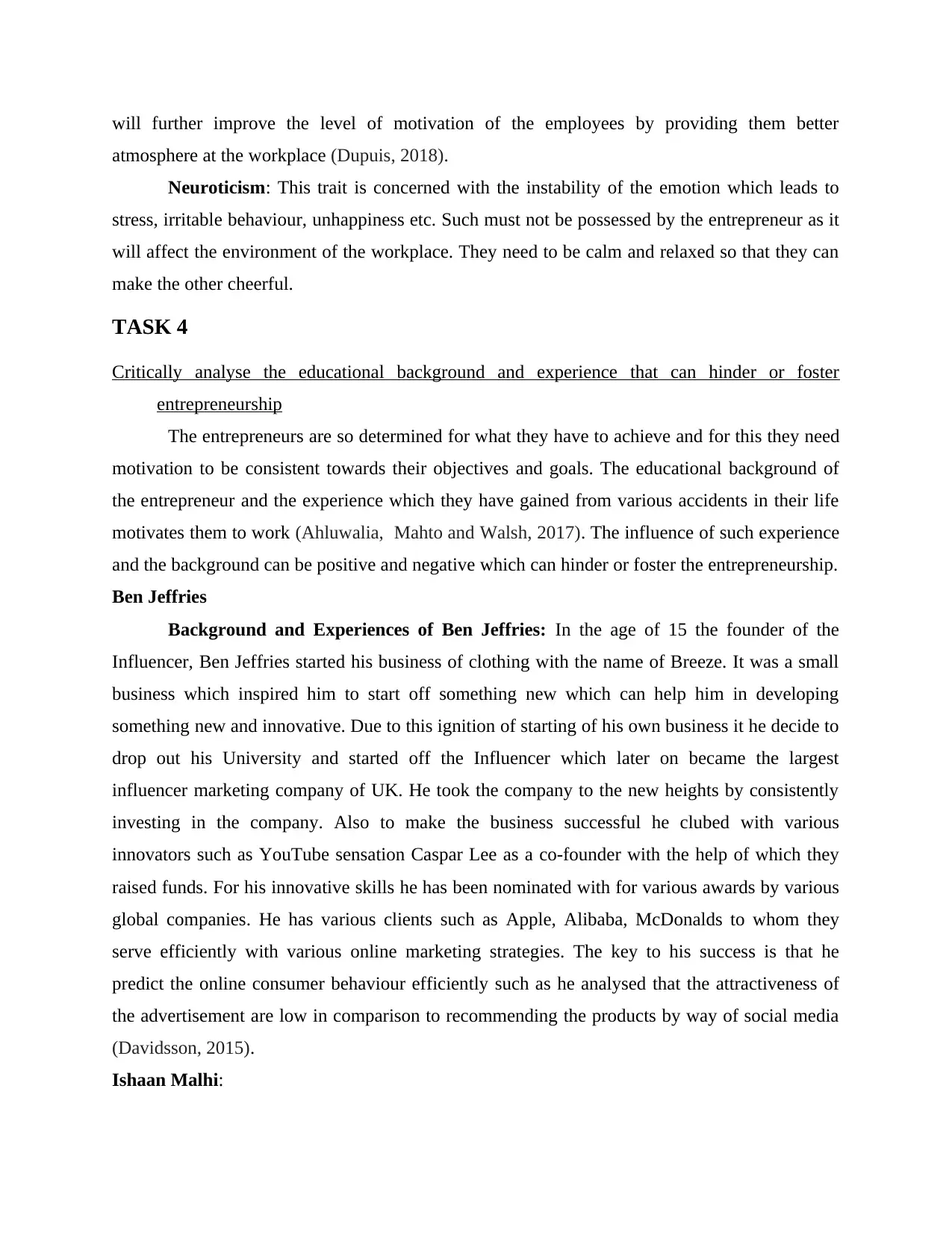
will further improve the level of motivation of the employees by providing them better
atmosphere at the workplace (Dupuis, 2018).
Neuroticism: This trait is concerned with the instability of the emotion which leads to
stress, irritable behaviour, unhappiness etc. Such must not be possessed by the entrepreneur as it
will affect the environment of the workplace. They need to be calm and relaxed so that they can
make the other cheerful.
TASK 4
Critically analyse the educational background and experience that can hinder or foster
entrepreneurship
The entrepreneurs are so determined for what they have to achieve and for this they need
motivation to be consistent towards their objectives and goals. The educational background of
the entrepreneur and the experience which they have gained from various accidents in their life
motivates them to work (Ahluwalia, Mahto and Walsh, 2017). The influence of such experience
and the background can be positive and negative which can hinder or foster the entrepreneurship.
Ben Jeffries
Background and Experiences of Ben Jeffries: In the age of 15 the founder of the
Influencer, Ben Jeffries started his business of clothing with the name of Breeze. It was a small
business which inspired him to start off something new which can help him in developing
something new and innovative. Due to this ignition of starting of his own business it he decide to
drop out his University and started off the Influencer which later on became the largest
influencer marketing company of UK. He took the company to the new heights by consistently
investing in the company. Also to make the business successful he clubed with various
innovators such as YouTube sensation Caspar Lee as a co-founder with the help of which they
raised funds. For his innovative skills he has been nominated with for various awards by various
global companies. He has various clients such as Apple, Alibaba, McDonalds to whom they
serve efficiently with various online marketing strategies. The key to his success is that he
predict the online consumer behaviour efficiently such as he analysed that the attractiveness of
the advertisement are low in comparison to recommending the products by way of social media
(Davidsson, 2015).
Ishaan Malhi:
atmosphere at the workplace (Dupuis, 2018).
Neuroticism: This trait is concerned with the instability of the emotion which leads to
stress, irritable behaviour, unhappiness etc. Such must not be possessed by the entrepreneur as it
will affect the environment of the workplace. They need to be calm and relaxed so that they can
make the other cheerful.
TASK 4
Critically analyse the educational background and experience that can hinder or foster
entrepreneurship
The entrepreneurs are so determined for what they have to achieve and for this they need
motivation to be consistent towards their objectives and goals. The educational background of
the entrepreneur and the experience which they have gained from various accidents in their life
motivates them to work (Ahluwalia, Mahto and Walsh, 2017). The influence of such experience
and the background can be positive and negative which can hinder or foster the entrepreneurship.
Ben Jeffries
Background and Experiences of Ben Jeffries: In the age of 15 the founder of the
Influencer, Ben Jeffries started his business of clothing with the name of Breeze. It was a small
business which inspired him to start off something new which can help him in developing
something new and innovative. Due to this ignition of starting of his own business it he decide to
drop out his University and started off the Influencer which later on became the largest
influencer marketing company of UK. He took the company to the new heights by consistently
investing in the company. Also to make the business successful he clubed with various
innovators such as YouTube sensation Caspar Lee as a co-founder with the help of which they
raised funds. For his innovative skills he has been nominated with for various awards by various
global companies. He has various clients such as Apple, Alibaba, McDonalds to whom they
serve efficiently with various online marketing strategies. The key to his success is that he
predict the online consumer behaviour efficiently such as he analysed that the attractiveness of
the advertisement are low in comparison to recommending the products by way of social media
(Davidsson, 2015).
Ishaan Malhi:
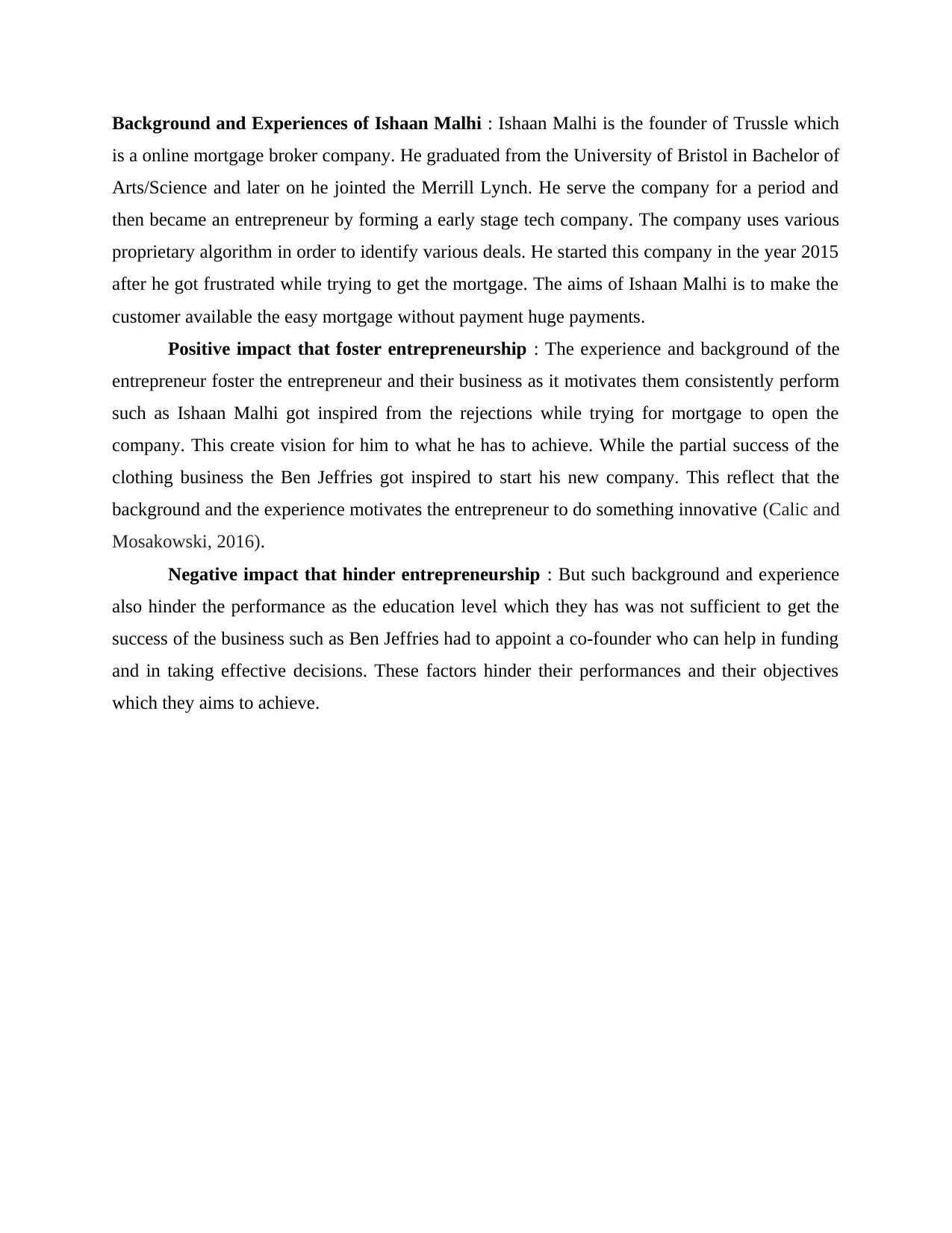
Background and Experiences of Ishaan Malhi : Ishaan Malhi is the founder of Trussle which
is a online mortgage broker company. He graduated from the University of Bristol in Bachelor of
Arts/Science and later on he jointed the Merrill Lynch. He serve the company for a period and
then became an entrepreneur by forming a early stage tech company. The company uses various
proprietary algorithm in order to identify various deals. He started this company in the year 2015
after he got frustrated while trying to get the mortgage. The aims of Ishaan Malhi is to make the
customer available the easy mortgage without payment huge payments.
Positive impact that foster entrepreneurship : The experience and background of the
entrepreneur foster the entrepreneur and their business as it motivates them consistently perform
such as Ishaan Malhi got inspired from the rejections while trying for mortgage to open the
company. This create vision for him to what he has to achieve. While the partial success of the
clothing business the Ben Jeffries got inspired to start his new company. This reflect that the
background and the experience motivates the entrepreneur to do something innovative (Calic and
Mosakowski, 2016).
Negative impact that hinder entrepreneurship : But such background and experience
also hinder the performance as the education level which they has was not sufficient to get the
success of the business such as Ben Jeffries had to appoint a co-founder who can help in funding
and in taking effective decisions. These factors hinder their performances and their objectives
which they aims to achieve.
is a online mortgage broker company. He graduated from the University of Bristol in Bachelor of
Arts/Science and later on he jointed the Merrill Lynch. He serve the company for a period and
then became an entrepreneur by forming a early stage tech company. The company uses various
proprietary algorithm in order to identify various deals. He started this company in the year 2015
after he got frustrated while trying to get the mortgage. The aims of Ishaan Malhi is to make the
customer available the easy mortgage without payment huge payments.
Positive impact that foster entrepreneurship : The experience and background of the
entrepreneur foster the entrepreneur and their business as it motivates them consistently perform
such as Ishaan Malhi got inspired from the rejections while trying for mortgage to open the
company. This create vision for him to what he has to achieve. While the partial success of the
clothing business the Ben Jeffries got inspired to start his new company. This reflect that the
background and the experience motivates the entrepreneur to do something innovative (Calic and
Mosakowski, 2016).
Negative impact that hinder entrepreneurship : But such background and experience
also hinder the performance as the education level which they has was not sufficient to get the
success of the business such as Ben Jeffries had to appoint a co-founder who can help in funding
and in taking effective decisions. These factors hinder their performances and their objectives
which they aims to achieve.
⊘ This is a preview!⊘
Do you want full access?
Subscribe today to unlock all pages.

Trusted by 1+ million students worldwide
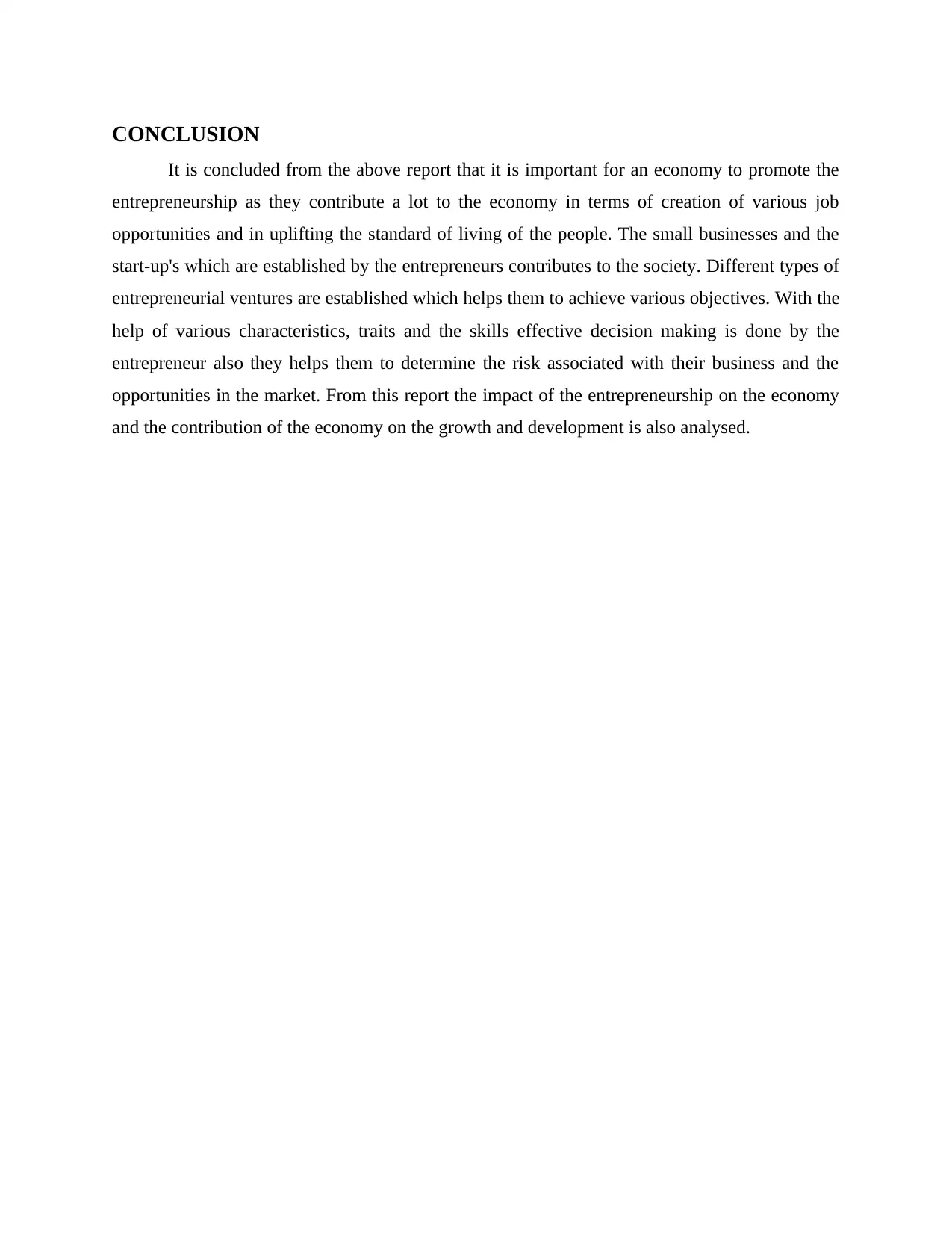
CONCLUSION
It is concluded from the above report that it is important for an economy to promote the
entrepreneurship as they contribute a lot to the economy in terms of creation of various job
opportunities and in uplifting the standard of living of the people. The small businesses and the
start-up's which are established by the entrepreneurs contributes to the society. Different types of
entrepreneurial ventures are established which helps them to achieve various objectives. With the
help of various characteristics, traits and the skills effective decision making is done by the
entrepreneur also they helps them to determine the risk associated with their business and the
opportunities in the market. From this report the impact of the entrepreneurship on the economy
and the contribution of the economy on the growth and development is also analysed.
It is concluded from the above report that it is important for an economy to promote the
entrepreneurship as they contribute a lot to the economy in terms of creation of various job
opportunities and in uplifting the standard of living of the people. The small businesses and the
start-up's which are established by the entrepreneurs contributes to the society. Different types of
entrepreneurial ventures are established which helps them to achieve various objectives. With the
help of various characteristics, traits and the skills effective decision making is done by the
entrepreneur also they helps them to determine the risk associated with their business and the
opportunities in the market. From this report the impact of the entrepreneurship on the economy
and the contribution of the economy on the growth and development is also analysed.
Paraphrase This Document
Need a fresh take? Get an instant paraphrase of this document with our AI Paraphraser
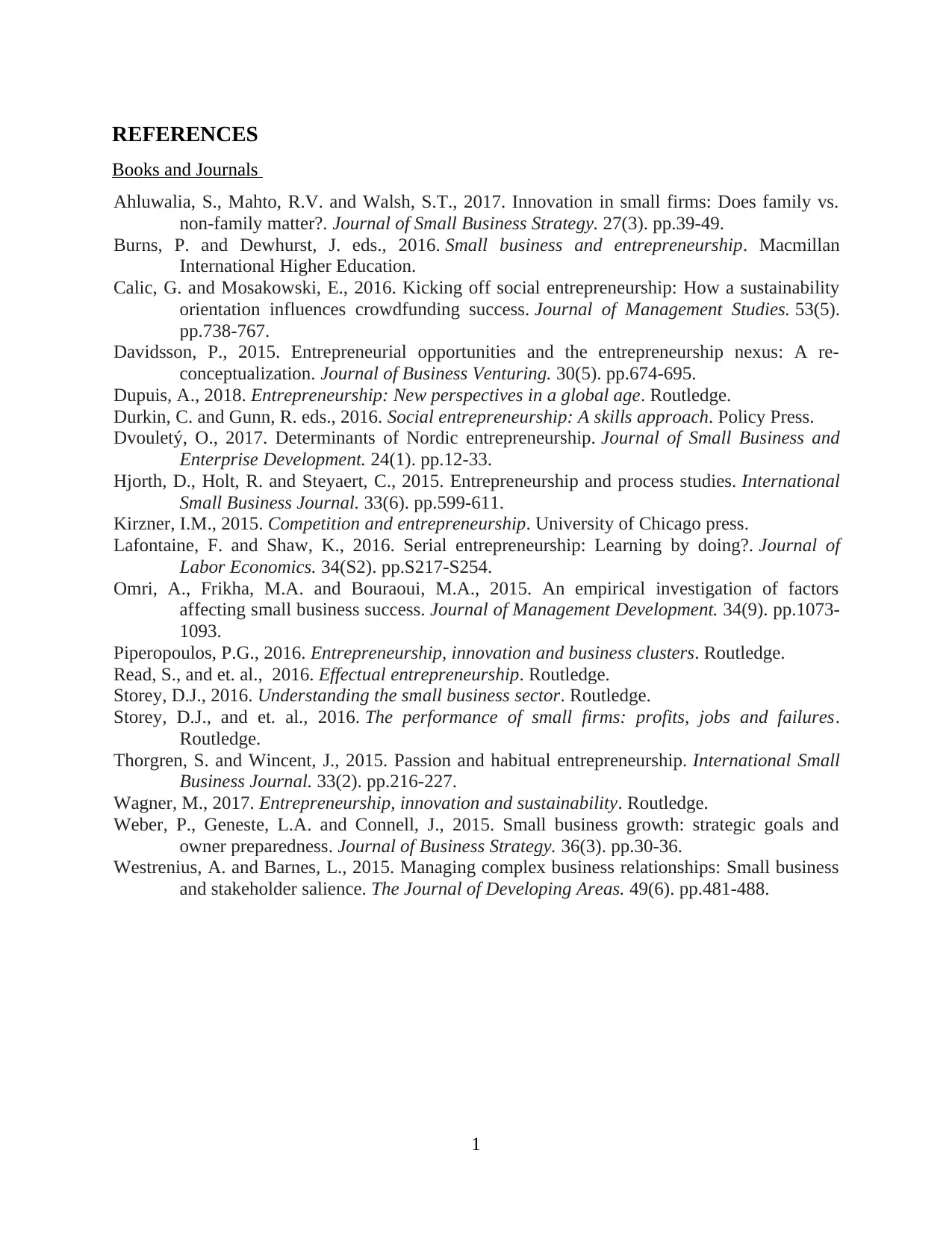
REFERENCES
Books and Journals
Ahluwalia, S., Mahto, R.V. and Walsh, S.T., 2017. Innovation in small firms: Does family vs.
non-family matter?. Journal of Small Business Strategy. 27(3). pp.39-49.
Burns, P. and Dewhurst, J. eds., 2016. Small business and entrepreneurship. Macmillan
International Higher Education.
Calic, G. and Mosakowski, E., 2016. Kicking off social entrepreneurship: How a sustainability
orientation influences crowdfunding success. Journal of Management Studies. 53(5).
pp.738-767.
Davidsson, P., 2015. Entrepreneurial opportunities and the entrepreneurship nexus: A re-
conceptualization. Journal of Business Venturing. 30(5). pp.674-695.
Dupuis, A., 2018. Entrepreneurship: New perspectives in a global age. Routledge.
Durkin, C. and Gunn, R. eds., 2016. Social entrepreneurship: A skills approach. Policy Press.
Dvouletý, O., 2017. Determinants of Nordic entrepreneurship. Journal of Small Business and
Enterprise Development. 24(1). pp.12-33.
Hjorth, D., Holt, R. and Steyaert, C., 2015. Entrepreneurship and process studies. International
Small Business Journal. 33(6). pp.599-611.
Kirzner, I.M., 2015. Competition and entrepreneurship. University of Chicago press.
Lafontaine, F. and Shaw, K., 2016. Serial entrepreneurship: Learning by doing?. Journal of
Labor Economics. 34(S2). pp.S217-S254.
Omri, A., Frikha, M.A. and Bouraoui, M.A., 2015. An empirical investigation of factors
affecting small business success. Journal of Management Development. 34(9). pp.1073-
1093.
Piperopoulos, P.G., 2016. Entrepreneurship, innovation and business clusters. Routledge.
Read, S., and et. al., 2016. Effectual entrepreneurship. Routledge.
Storey, D.J., 2016. Understanding the small business sector. Routledge.
Storey, D.J., and et. al., 2016. The performance of small firms: profits, jobs and failures.
Routledge.
Thorgren, S. and Wincent, J., 2015. Passion and habitual entrepreneurship. International Small
Business Journal. 33(2). pp.216-227.
Wagner, M., 2017. Entrepreneurship, innovation and sustainability. Routledge.
Weber, P., Geneste, L.A. and Connell, J., 2015. Small business growth: strategic goals and
owner preparedness. Journal of Business Strategy. 36(3). pp.30-36.
Westrenius, A. and Barnes, L., 2015. Managing complex business relationships: Small business
and stakeholder salience. The Journal of Developing Areas. 49(6). pp.481-488.
1
Books and Journals
Ahluwalia, S., Mahto, R.V. and Walsh, S.T., 2017. Innovation in small firms: Does family vs.
non-family matter?. Journal of Small Business Strategy. 27(3). pp.39-49.
Burns, P. and Dewhurst, J. eds., 2016. Small business and entrepreneurship. Macmillan
International Higher Education.
Calic, G. and Mosakowski, E., 2016. Kicking off social entrepreneurship: How a sustainability
orientation influences crowdfunding success. Journal of Management Studies. 53(5).
pp.738-767.
Davidsson, P., 2015. Entrepreneurial opportunities and the entrepreneurship nexus: A re-
conceptualization. Journal of Business Venturing. 30(5). pp.674-695.
Dupuis, A., 2018. Entrepreneurship: New perspectives in a global age. Routledge.
Durkin, C. and Gunn, R. eds., 2016. Social entrepreneurship: A skills approach. Policy Press.
Dvouletý, O., 2017. Determinants of Nordic entrepreneurship. Journal of Small Business and
Enterprise Development. 24(1). pp.12-33.
Hjorth, D., Holt, R. and Steyaert, C., 2015. Entrepreneurship and process studies. International
Small Business Journal. 33(6). pp.599-611.
Kirzner, I.M., 2015. Competition and entrepreneurship. University of Chicago press.
Lafontaine, F. and Shaw, K., 2016. Serial entrepreneurship: Learning by doing?. Journal of
Labor Economics. 34(S2). pp.S217-S254.
Omri, A., Frikha, M.A. and Bouraoui, M.A., 2015. An empirical investigation of factors
affecting small business success. Journal of Management Development. 34(9). pp.1073-
1093.
Piperopoulos, P.G., 2016. Entrepreneurship, innovation and business clusters. Routledge.
Read, S., and et. al., 2016. Effectual entrepreneurship. Routledge.
Storey, D.J., 2016. Understanding the small business sector. Routledge.
Storey, D.J., and et. al., 2016. The performance of small firms: profits, jobs and failures.
Routledge.
Thorgren, S. and Wincent, J., 2015. Passion and habitual entrepreneurship. International Small
Business Journal. 33(2). pp.216-227.
Wagner, M., 2017. Entrepreneurship, innovation and sustainability. Routledge.
Weber, P., Geneste, L.A. and Connell, J., 2015. Small business growth: strategic goals and
owner preparedness. Journal of Business Strategy. 36(3). pp.30-36.
Westrenius, A. and Barnes, L., 2015. Managing complex business relationships: Small business
and stakeholder salience. The Journal of Developing Areas. 49(6). pp.481-488.
1
1 out of 11
Related Documents
Your All-in-One AI-Powered Toolkit for Academic Success.
+13062052269
info@desklib.com
Available 24*7 on WhatsApp / Email
![[object Object]](/_next/static/media/star-bottom.7253800d.svg)
Unlock your academic potential
Copyright © 2020–2026 A2Z Services. All Rights Reserved. Developed and managed by ZUCOL.





